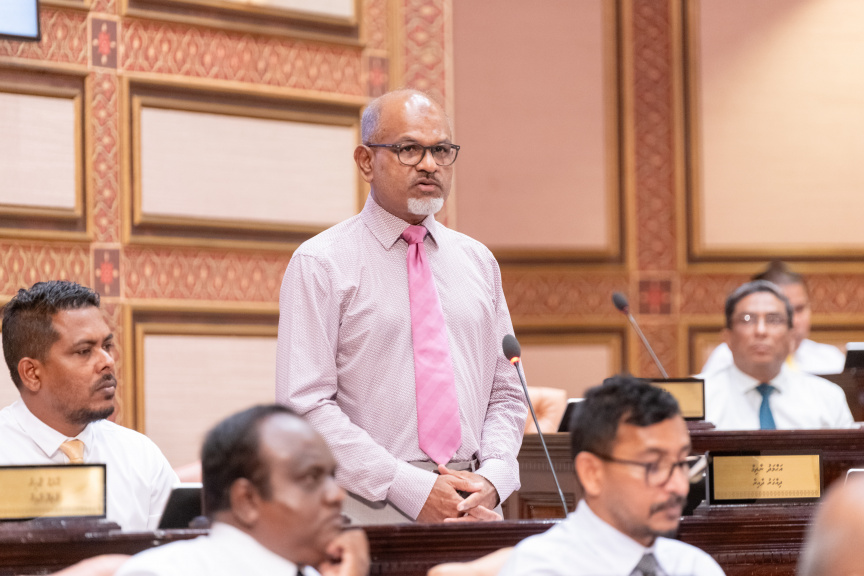
Deputy Speaker, Dhiggaru MP Ahmed Nazim. (Photo/People's Majlis)
Deputy Speaker Ahmed Nazim alleged on Tuesday that media outlets in the Maldives all engage in checkbook journalism, warning that the country cannot make any progress in the field of journalism for as long as media outlets “continue to write in favor of whoever pays money,” as he also confirmed his involvement in drafting a new bill that seeks to overhaul the self-regulatory media system in the Maldives.
On Monday, Thulhaadhoo MP Abdul Hannan Aboobakr, an independent lawmaker aligned with the government, submitted a new bill that seeks to dissolve the Maldives Media Council (MMC) and the Maldives Broadcasting Commission (BroadCom), replacing them with a single regulatory body — the Maldives Media and Broadcasting Commission.
The new bill follows a similar one submitted by Hannan back in November 2024, which was later withdrawn following pushback from media.
According to the Maldives Media and Broadcasting Regulation Bill, the new seven-member commission will be composed of four members elected by the media and three appointed by the President with parliamentary approval, with the President also given the authority to appoint the commission’s head.
The proposed changes have been slammed by both the MMC, and the Maldives Journalists Association (MJA) as a direct threat to press freedom, the latter of which also accused Nazim, a senior politician from the ruling People’s National Congress (PNC), of being involved in drafting the bill, which it also believes is evidence of government involvement in the bill.
Joining the preliminary debate on the bill on Tuesday morning, Nazim said he had been involved in research for the new bill, following pushback for the earlier one submitted by Hannan last year.
The Dhiggaru representative said that he had talked to journalists who had opposed the original bill as part of this research in a bid to address concerns from the media.
“I myself was heavily involved in some of the research for this bill. I talked to the media people who objected [to the earlier bill] and tried to put all their opinions into one page,” he said.
Nazim expressed satisfaction with the new bill, which he said is based on the legal framework used in countries such as Singapore, the UK and other European countries.
“The new bill is drafted in line with a lot of international standards,” he said.
Nazim also criticized local media outlets, all of which he said engage in checkbook journalism.
He said that media outlets depend on sponsorship from business owners and government companies, and propagate false information without any restrictions.
“Media outlets write their headlines however the business magnates and moneymakers who pay them money ask them to,” he said.
“Looking at the current situation, we see media outlets engage in unrestricted defamation of people, infringing on their private interests, and also causing discord in small islands and regions of this country.”
Nazim said that responsible journalism means being financially independent.
“I do not believe there can be any progress in journalism in this country for as long as they continue to back whichever administration is in power, accept whatever the government gives them and write whatever the government tells them to,” he said.
Nazim said that journalists who continue to have concerns regarding the bill can raise it during the committee review.
“We need to show maturity when such a bill is submitted to the Parliament. If there are concerns, it can be amended during the committee stage, and we can work to minimize differences,” he said, as a group of journalists sat in the gallery holding their hands to their mouth in silent protest of the proposed changes.
In addition to allowing the President power over appointment of its members, the new bill also empowers the proposed commission to impose major penalties against media outlets as well as individual journalists, including during the investigative stage. This includes:
While the MMC, the MJA and the opposition protest against the new media bill as a threat to press freedom, it is backed by the government, which insists the legislature is designed to empower the press and protect press freedom.